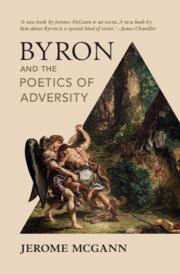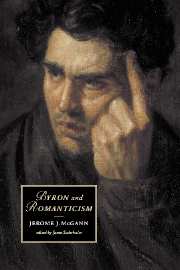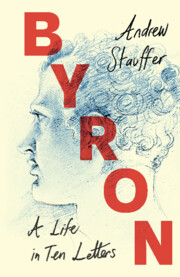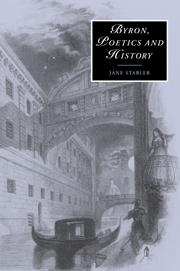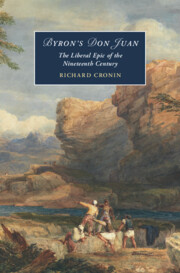Byron and the Poetics of Adversity
- Author: Jerome McGann, University of Virginia
- Date Published: December 2022
- availability: In stock
- format: Hardback
- isbn: 9781009232951
Hardback
Other available formats:
eBook
Looking for an inspection copy?
This title is not currently available on inspection
-
A long line of traditional, often conservative, criticism and cultural commentary deplored Byron as a slipshod poet. This pithy yet aptly poetic book, written by one of the world's foremost Romantic scholars, argues that assessment is badly mistaken. Byron's great subject is what he called 'Cant': the habit of abusing the world through misusing language. Setting up his poetry as a laboratory to investigate failures of writing, reading, and thinking, Byron delivered sharp critical judgment on the costs exacted by a careless approach to his Mother Tongue. Perspicuous readings of Byron alongside some of his Romantic contemporaries – Burns, Blake, Wordsworth, Coleridge, Shelley – reveal Byron's startling reconfiguration of poetry as a 'broken mirror' and shattered lamp. The paradoxical result was to argue that his age's contradictions, and his own, offered both ethical opportunities and a promise of poetic – broadly cultural – emancipation. This book represents a major contribution to ideas about Romanticism.
Read more- Offers numerous close readings of passages throughout Byron's work, as well as a series of comparisons with poets such as Blake, Scott, Wordsworth, Coleridge, Shelley, and Burns, to explain how Byron challenged the limits of what poetry could achieve
- Provides numerous examples of how Byron used his verse to mount a broad critique of the contradictions and hypocrisies of his age and audience, and of the 'wrong revolutionary poetical system' of Romantic Enlightenment
- Explores Byron's ideal of a 'poetics' delivered from the inner standing point of verse itself, as opposed to the abstracted form of prose explanation
Reviews & endorsements
'A new book by Jerome McGann is an event, though there have been many such events over his long career. But a new book by him about Byron is a special kind of event. No other scholar has done as much for Byron as McGann has, and few living scholars as much for any single author as he has done for Byron. This book marks a kind of return to origins since, like McGann's first book, Fiery Dust, this one focuses on Byron's work before Don Juan. The new emphasis, however, falls on Byron's relationship to language and poetic craft and on how it differs from that of his major contemporaries. Playful, allusive, and itself 'adverse,' McGann's style in this book, like Byron's own, means to set our language free.' James K. Chandler, William K. Ogden Distinguished Service Professor, University of Chicago
See more reviews'Take physic, cant. The words are nowhere, the command everywhere in Byron and McGann. The physic is philology: a word-loving that embraces the cunning, ambivalence, and enthrallments of language along with its beauties and benevolences. If words are actions (and who today could doubt that), McGann's 'inner standing point' (D. G. Rossetti) on Byron is as a sword that divides, setting fiction against factitiousness, expressive contradiction against the suavities of doublespeak. McGann's 'little book,' as he calls it, is a work of pity and rage; its perfectly measured disorders a min(e)d-field to blast the pieties of the present. Go litel book…' Marjorie Levinson, F. L. Huetwell Professor, University of Michigan
'This is a book written with much of Byron's own intelligence, wit, and passion. It pays particular and welcome attention to the 'dark' poems which Professor McGann sees as 'in some ways more impressive than the ottava rima masterpieces'. It moves between very wide perspectives and sustained, often dazzling, close reading helped by his unrivalled knowledge of the textual history.' Bernard Beatty, Bernard Beatty, Senior Fellow in English, Liverpool University and Editor of The Byron Journal 1987–2004
'Combative, liberatory, and dazzling, Byron's poetics receive the close attention they deserve in McGann's beautiful book. Byron and the Poetics of Adversity illuminates the full sweep of Byron's poetic experimentation and ruthless unveiling of his culture's cherished illusions in poems such as Manfred, The Giaour, Lara, and Cain, difficult poems often undervalued in favor of the poetic pyrotechnics of the epic Don Juan. McGann's scholarly and playful close readings of the full range of Byron's 'perversifications' and their 'disastered heroes' reveal new dimensions of what made these poems both scandalous and brilliant, and how they engaged with leading writers of the age like Blake and Goethe.' Adriana Craciun, Emma MacLachlan Metcalf Chair of Humanities, Boston University
'Byron and the Poetics of Adversity is a genuinely revolutionary book in which Professor McGann returns to the textual entanglements of Byron's prosody and looks afresh at the two phases of Byron's poetic career in 1808-16 and 1817-24. Seven brilliant, compelling essays trace the poetic offensives that connect The Giaour, The Corsair, Lara, The Siege of Corinth, shorter lyrics and Manfred with the offensive poetics of Don Juan. Identifying practical criticism as the vital, oppositional act which Byron's poetry commits on its readers and demands from them, this bold and provocative study goes back to where all the ladders start - in close readings of some of the most perverse lines in Romantic period poetry.' Jane Stabler, University of St Andrews
'Jerome McGann shows that Byron's 'treasonous' attitude to poetry, his 'perversification,' his unfit and shifty tones, his Blakean refusal of invariable aesthetic systems, his 'spoiler's art' is as pertinent now as it was 200 years ago. By repeatedly exposing the shibboleths of lyric and Romantic verse culture, McGann's sweeping advocacy of Byron's inventive, performative, rhetorical, and adversive genius is a defense of poetry for our time as well.' Charles Bernstein, author of Topsy-Turvy
'McGann's style is vivid and animated, exuberant even … [he] makes the reader feel, while immersed, that nothing could be more important than the task in hand … he writes not only to evoke poetic excellences, but also to make a timely intervention … You may not always agree with his diagnosis of what needs to be done, but you never end a piece by McGann without feeling that you've been put through your paces and are better for it.' Seamus Perry, Times Literary Supplement
'McGann's writing style is accessible, direct, modern - and provides a doubly pointed contrast to the didactic denigration of Byron in the early twentieth-century readings he challenges. I also want to take a moment to consider the physical form of this book because the engaging accessibility of McGann's authorial voice is reflected in the size of Poetics of Adversity which is, itself, a 'little book.' Unusually small for a scholarly monograph, it is easy to carry in a pocket, easy to read one-handed, and its physical form not only recalls Byron's tongue-in-cheek description of 'Don Juan' (itself a parodical jibe at Robert Southey's smug satisfaction with Carmen Nuptiale), but also facilitates the pleasurable act of reading Byron and reading about Byron (my first reading was standing in a swimming pool, pencil in hand).' Emily Paterson-Morgan, European Romantic Review
Customer reviews
Not yet reviewed
Be the first to review
Review was not posted due to profanity
×Product details
- Date Published: December 2022
- format: Hardback
- isbn: 9781009232951
- length: 226 pages
- dimensions: 194 x 129 x 18 mm
- weight: 0.3kg
- availability: In stock
Table of Contents
1. Don Juan and the English language
2. Byron Agonistes, 1809–1816
3. Manfred: one word for mercy
4. Byron and the 'Wrong Revolutionary Poetical System'
5. Byron, Blake, and the adversity of poetics
6. The stubborn foe: bad verse and the poetry of action.
Sorry, this resource is locked
Please register or sign in to request access. If you are having problems accessing these resources please email [email protected]
Register Sign in» Proceed
You are now leaving the Cambridge University Press website. Your eBook purchase and download will be completed by our partner www.ebooks.com. Please see the permission section of the www.ebooks.com catalogue page for details of the print & copy limits on our eBooks.
Continue ×Are you sure you want to delete your account?
This cannot be undone.
Thank you for your feedback which will help us improve our service.
If you requested a response, we will make sure to get back to you shortly.
×
